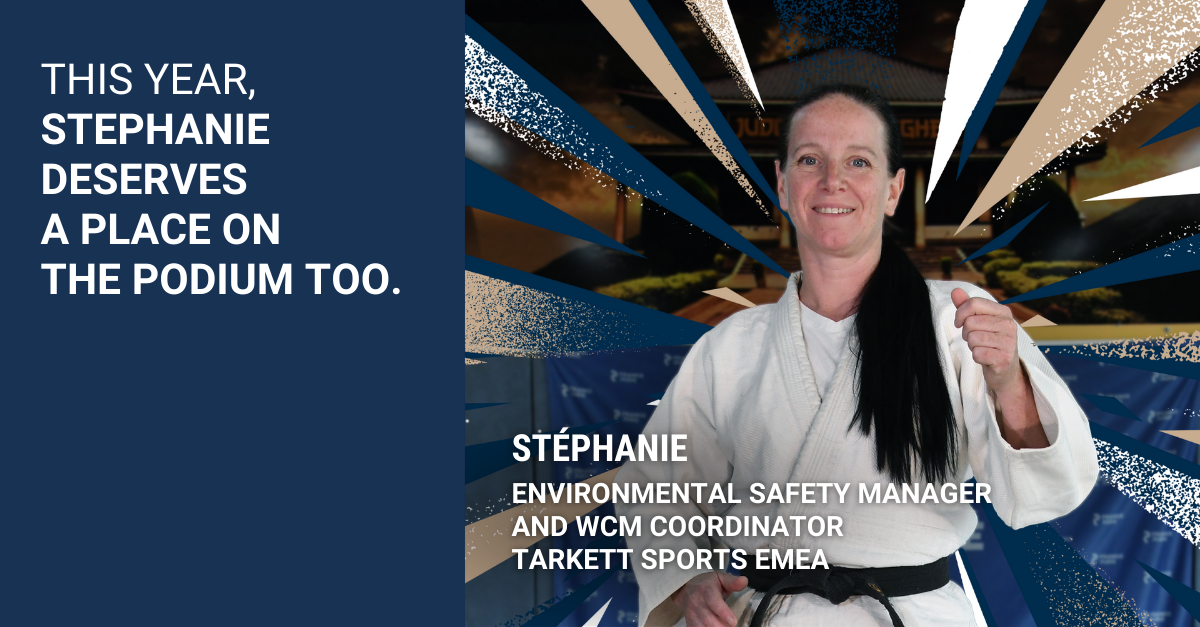Stephanie Bauduin, Environmental safety manager and WCM Coordinator at Tarkett Sports EMEA, combines her passion for judo with her professional commitment at Tarkett Sports, infusing the values of the tatami into every aspect of her daily life.
 ©Tarkett Sports
©Tarkett Sports
A passion born from childhood: judo as a way of life
For Stephanie Bauduin, judo goes beyond sport, it is a real passion rooted in her personal history since her childhood. “Judo has always been present in my family. My younger brother and father were involved in the sport, and I was naturally drawn to the sport from a young age,” she shares enthusiastically.
Her decision to start judo at the age of 15 marked the beginning of a deep commitment that would shape much of her life. “I quickly developed a taste for the intensity and discipline of judo. At the time, I trained diligently, going to the dojo four times a week,” recalls Stéphanie.
This determination allowed her to quickly rise through the ranks, reaching the level of black belt in just three years, a feat that attests to her dedication and athletic ability. Although her university studies interrupted her practice of judo, Stéphanie never really gave up her passion for the sport. “In 2017, after a long time without practicing regularly, I decided to return to judo in my new city,” she explains. This return to the tatami was particularly significant, not only for regaining physical fitness but also for reconnecting with an important part of her personal identity. “Finding judo again was like reuniting with an old friend. It was an enriching experience to rediscover the sensations of combat and self-control,” says Stephanie.
Unforgettable moments and personal challenges
This reconnection with judo was also reinforced by the participation of her husband, who began to practice this sport alongside her, also quickly becoming a black belt. “Judo has become a central part of our life as a couple, allowing us to share strong moments, recharge our batteries and support each other in our progress,” she adds with a smile.
Among Stephanie’s fondest memories, certain moments on the tatami stand out for their emotional intensity and personal significance. “I have end-of-year photos with my father and brother, all three in kimono. These moments mean a lot to me, because they capture our family bond through judo,” she says.
 ©Tarkett Sports
©Tarkett Sports
Moreover, the challenges she has faced in competition, such as competing against male opponents and mastering difficult technical events, have strengthened her resilience and confidence. One of the most memorable moments of her judoka career was getting her kata for second dan. “It was an intense period of physical and mental preparation, but it was also a great source of pride and accomplishment when I succeeded,” she said with emotion.
This success not only consolidated her technical skills but also paved the way for new opportunities in teaching and refereeing, highlighting her continued commitment to judo.
Judo: a path to personal and professional fulfillment
For Stephanie, judo is much more than just a competitive sport: it’s a way of life that permeates every aspect of her existence. “Judo taught me values such as discipline, respect, perseverance and pushing oneself beyond limits, qualities that are essential not only on the tatami but also in my professional career,” she said. As Environmental safety manager and WCM Coordinator at Tarkett Sports EMEA, these values are manifested through her leadership and her rigorous and methodical approach to ensuring the health and safety of the company’s employees and processes in a sustainable manner.
“Practicing judo allows me to recharge my batteries mentally and physically. It’s a form of balance that helps me manage stress and stay focused on my professional responsibilities,” explains Stephanie. Her ability to apply the teachings of judo to her daily life is a testament to her commitment to ongoing personal growth and professional integrity. “Judo is much more than a physical activity for me; it’s a path to personal fulfillment and a framework for nurturing meaningful relationships,” she concludes.




